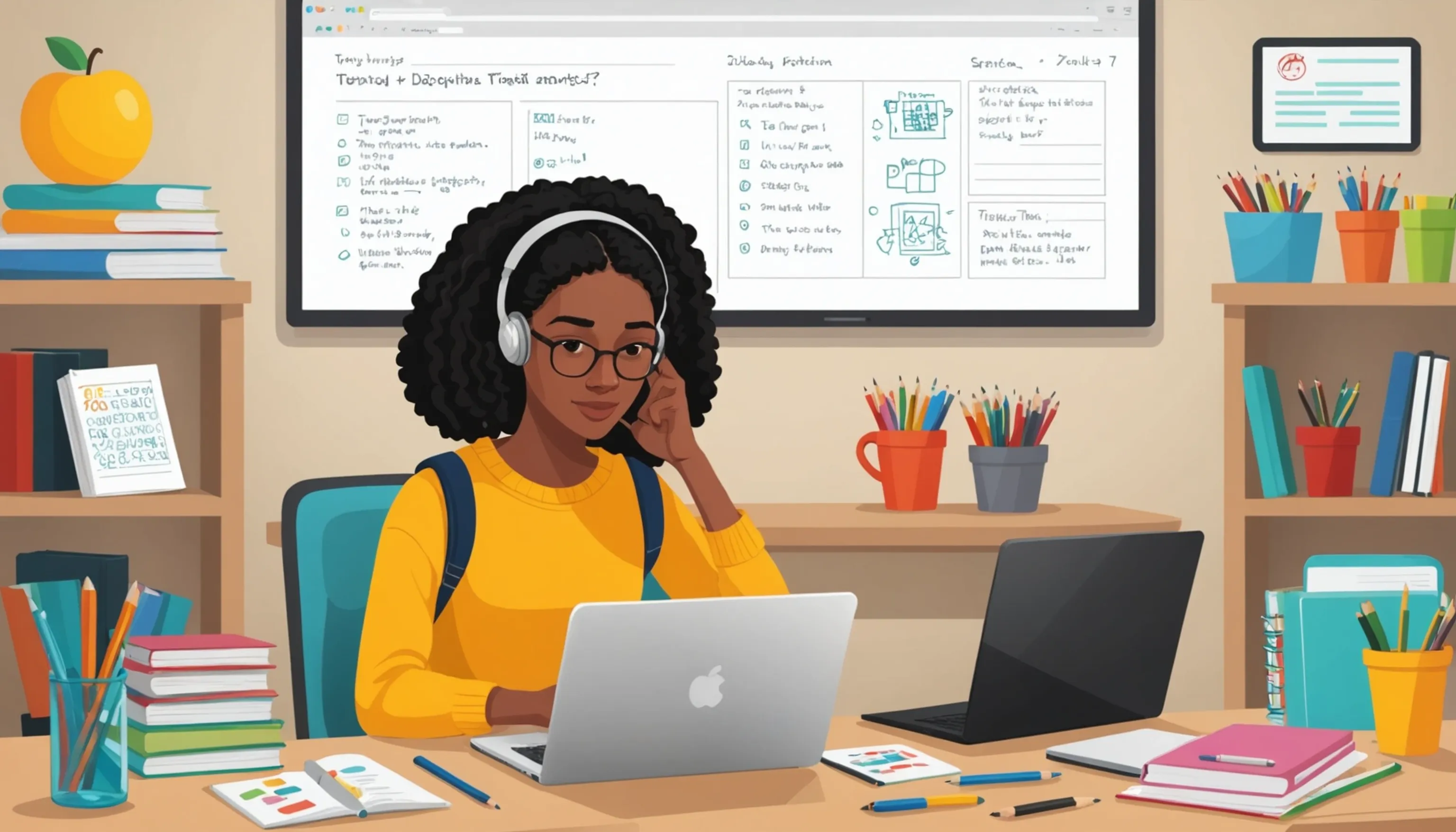Heal Math Anxiety in Teens
 HvWHenry van Wagenberg
HvWHenry van Wagenberg
Strategies to Heal Math Anxiety in Teens
Healing math anxiety in teens requires a multifaceted approach. First, it's essential to foster a positive environment where mistakes are seen as part of the learning process. Encourage open discussions about feelings towards math to help teens express their fears.
Incorporating fun and engaging math activities can significantly reduce anxiety. Games and real-world applications of math, such as budgeting or cooking, can make learning more relatable. Additionally, practicing relaxation techniques, like deep breathing, before math tasks can help calm nerves and improve focus.
Understanding Math Anxiety
Math anxiety is a common issue that affects many teenagers, often manifesting as a feeling of dread or fear when faced with math-related tasks. Understanding this phenomenon is crucial for parents and educators seeking to support their teens. Math anxiety can stem from various sources, including negative past experiences with math, a lack of confidence in one’s abilities, or societal pressures that label math as a difficult subject.
Research indicates that approximately 20% of students experience significant levels of math anxiety, which can hinder their ability to perform well in class. This anxiety can lead to avoidance behaviors, such as skipping math classes or procrastinating on assignments. It’s important to recognize the signs of math anxiety, which may include physical symptoms like sweating, rapid heartbeat, or stomachaches, as well as mental symptoms such as difficulty concentrating or negative self-talk.
Understanding the roots of math anxiety allows adults to provide the right support. Factors like parental attitudes towards math, peer influences, and teaching styles can all contribute to a teen's anxiety. By fostering a growth mindset and emphasizing effort over innate ability, parents and teachers can create an environment where teens feel safe to explore and improve their math skills.
Ultimately, recognizing and addressing math anxiety is essential in helping teens build confidence and improve their overall academic performance.
Signs of Math Anxiety in Teens
Recognizing the signs of math anxiety in teens is crucial for providing timely support. This anxiety can manifest in various ways, both emotionally and physically. One of the most common signs is avoidance behavior. A teen may consistently skip math classes, procrastinate on homework, or express a strong dislike for the subject, indicating that they are trying to escape the discomfort associated with math.
Emotionally, teens with math anxiety may exhibit symptoms such as low self-esteem and feelings of helplessness when faced with math tasks. They might frequently verbalize negative thoughts, such as "I’m just not good at math" or "I’ll never understand this." This self-doubt can further perpetuate their anxiety.
Physically, math anxiety can trigger stress responses. Teens may experience symptoms like a racing heart, sweating, headaches, or stomachaches when confronted with math-related situations. These physical reactions can make the experience of learning math even more daunting.
In classroom settings, you may notice a teen becoming visibly distressed during tests or quizzes, displaying signs of frustration or panic. They might also struggle to concentrate, often staring blankly at problems or freezing when asked to solve a math question aloud.
Being aware of these signs allows parents and teachers to intervene early. By fostering a supportive environment and encouraging open discussions about feelings, adults can help alleviate some of the pressures associated with math anxiety.

The Impact of Math Anxiety on Learning
The impact of math anxiety on learning can be profound and long-lasting. When teens experience anxiety related to math, it can hinder their ability to understand and retain mathematical concepts. Research shows that students with high levels of math anxiety often perform worse on tests compared to their less anxious peers, even when they possess similar levels of knowledge. This discrepancy can create a vicious cycle, where poor performance reinforces their anxiety, leading to even more avoidance of math-related tasks.
Math anxiety can also affect a student’s overall attitude towards education. A teen who struggles with math may develop a negative self-image, believing they are “bad” at school in general. This belief can lead to decreased motivation and engagement in other subjects, impacting their overall academic performance.
In addition, math anxiety can impair problem-solving abilities. When under stress, the brain’s capacity to think critically and logically can diminish. Teens may find it challenging to approach math problems methodically, leading to further frustration and a sense of defeat.
Moreover, the social aspects of learning can be affected. Teens with math anxiety may avoid participating in group activities, fearing they will be judged by peers. This isolation can limit opportunities for collaborative learning and peer support, both of which are essential for mastering math concepts.
Ultimately, addressing math anxiety is crucial not only for improving mathematical skills but also for enhancing overall academic success and self-esteem in teens.
Creating a Supportive Environment
Creating a supportive environment for teens dealing with math anxiety is essential for their success. Start by fostering an atmosphere where mistakes are viewed as learning opportunities rather than failures. Encourage open conversations about math-related fears, allowing teens to express their feelings without judgment.
Moreover, ensure that math is presented in a fun and engaging manner. Incorporate games and real-life applications to make learning relevant. Additionally, providing consistent positive reinforcement can help build their confidence. Establishing a routine that includes regular practice, along with relaxation techniques, can also enhance their comfort level with math.
Encouraging Positive Mindset
Encouraging a positive mindset in teens dealing with math anxiety is crucial for their academic success and emotional well-being. A positive mindset allows students to view challenges as opportunities for growth rather than insurmountable obstacles. One effective way to foster this mindset is through the practice of growth mindset principles, which emphasize that abilities can be developed through dedication and hard work.
Start by praising effort over innate talent. For instance, when a teen struggles with a math problem, focus on their persistence and willingness to try again rather than simply the correctness of their answer. This approach reinforces the idea that mistakes are part of the learning process. Additionally, sharing stories of individuals who overcame challenges can inspire teens to adopt a similar attitude towards their own difficulties.
Incorporating positive affirmations into daily routines can also be beneficial. Encourage teens to repeat affirmations such as, "I can improve my math skills with practice" or "I am capable of solving challenging problems." These affirmations can help reshape their thought patterns over time.
Moreover, teaching relaxation techniques, like deep breathing or mindfulness, can help teens manage their anxiety when faced with math tasks. By creating a calm and focused mindset, they are better prepared to tackle challenges head-on. Ultimately, fostering a positive mindset not only helps teens cope with math anxiety but also instills a lifelong love for learning.

Providing Resources and Tools
Providing the right resources and tools is essential in helping teens overcome math anxiety. These resources can enhance understanding, build confidence, and create a more enjoyable learning experience. Here are some effective strategies:
- Online Tutorials: Websites like Khan Academy and YouTube offer free video tutorials that break down complex math concepts into manageable parts. These platforms allow teens to learn at their own pace.
- Math Apps: Interactive apps like Photomath or Mathway can help students solve problems step-by-step, showing them the process involved. This can reinforce learning and demystify difficult topics.
- Math Games: Incorporating games into learning can make math fun. Board games, card games, and online math games can help reinforce skills while reducing anxiety.
- Study Groups: Encourage teens to form or join study groups. Collaborating with peers can provide support, foster a sense of community, and create a safe space to discuss challenges.
- Tutoring: If possible, consider hiring a tutor who specializes in math anxiety. A tutor can provide personalized attention and tailor lessons to suit the teen’s specific needs.
Additionally, providing printed or digital resources, such as cheat sheets or formula guides, can serve as handy references during study sessions. By equipping teens with these resources and tools, you empower them to take control of their learning and reduce math anxiety.
Communicating Openly About Math Anxiety
Communicating openly about math anxiety is vital for helping teens feel supported and understood. Open dialogue fosters a safe environment where they can express their fears and challenges without judgment. Here are some effective strategies for facilitating this communication:
- Start the Conversation: Initiate discussions about math anxiety during casual moments. Ask open-ended questions like, "How do you feel about your math homework?" This encourages teens to share their thoughts and feelings.
- Normalize the Experience: Share stories of your own struggles with math or other subjects. By showing that anxiety is a common experience, teens may feel less isolated and more willing to talk about their own challenges.
- Active Listening: When teens express their feelings, practice active listening. Maintain eye contact, nod in understanding, and refrain from interrupting. This demonstrates that their feelings are valid and important.
- Encourage Expression: Suggest different ways for teens to express their feelings about math anxiety. This could include writing in a journal, creating art, or even discussing it with friends.
- Collaborative Problem-Solving: Work together to identify specific triggers of their anxiety and brainstorm solutions. This collaborative approach empowers teens to take an active role in addressing their challenges.
By fostering open communication, parents and educators can help teens feel more comfortable discussing their anxiety. This not only alleviates stress but also paves the way for finding effective coping strategies and support.
Techniques to Build Math Confidence
Building math confidence in teens is essential for overcoming anxiety and improving performance. Here are some effective techniques:
- Practice Regularly: Consistent practice helps reinforce concepts and improve skills, gradually building confidence.
- Set Achievable Goals: Encourage teens to set small, attainable goals. Celebrating these milestones can boost their self-esteem.
- Positive Reinforcement: Acknowledge their efforts and progress, even in small steps, to foster a sense of accomplishment.
- Peer Support: Encourage collaboration with friends or study groups, allowing them to share knowledge and learn together.
These techniques can create a stronger foundation for math success.
Incorporating Fun Math Activities
Incorporating fun math activities into learning can significantly enhance engagement and reduce anxiety for teens struggling with mathematics. When math is presented in an enjoyable format, it becomes less intimidating and more accessible. Here are some effective ways to make math enjoyable:
- Math Games: Board games like Monopoly or card games that involve calculations can make math practice feel more like play. Online platforms such as Prodigy Math or Math Playground offer interactive games that reinforce math skills in a fun setting.
- Real-World Applications: Integrate math into everyday activities, like cooking or budgeting. Have teens measure ingredients for a recipe or track expenses for a project. This not only makes math relevant but also shows its practical applications.
- Math Challenges: Organize friendly competitions, such as math quizzes or scavenger hunts with math-related clues. This encourages teamwork and adds an element of excitement to learning.
- Creative Projects: Combine art and math by engaging in projects like creating geometric art or designing patterns. This allows teens to express their creativity while practicing math concepts.
- Field Trips: Plan outings that involve math, such as visiting a science museum or exploring architecture in your city. These experiences can spark interest and show the real-world relevance of math.
By incorporating these fun activities into math learning, teens can build confidence, reduce anxiety, and develop a more positive attitude towards the subject.
Using Real-World Applications of Math
Using real-world applications of math is an effective strategy for helping teens connect mathematical concepts to their everyday lives. When students see the relevance of math in real situations, it can significantly enhance their interest and understanding. Here are several ways to integrate real-world math applications into learning:
- Budgeting and Finance: Teach teens how to create a budget by tracking their income and expenses. This practical exercise helps them understand percentages, addition, and subtraction while managing their finances.
- Cooking and Baking: Involve teens in meal preparation, focusing on measurements and conversions. Recipes require understanding fractions and proportions, making cooking an engaging way to practice math.
- Shopping: Use grocery shopping as an opportunity to teach teens about price comparisons, discounts, and calculating total costs. They can practice percentages by determining sale prices and understanding how taxes affect final prices.
- Sports Statistics: Encourage teens to analyze sports data, such as player statistics or game scores. This can help them practice calculations like averages, ratios, and percentages in a context they enjoy.
- Home Improvement Projects: Involving teens in home projects like measuring spaces for furniture or calculating paint quantities can make math tangible. They can apply geometry to measure areas and understand measurements in practical scenarios.
By incorporating these real-world applications of math, educators and parents can help teens recognize the value of math in daily life, enhancing their learning experience and reducing anxiety.
Practicing Relaxation Techniques
Practicing relaxation techniques can be a powerful tool for teens dealing with math anxiety. These techniques help reduce stress and create a calm mental state, which is essential for effective learning. Here are some effective methods to incorporate relaxation into math study sessions:
- Deep Breathing: Teach teens to practice deep breathing exercises. Inhale slowly through the nose for a count of four, hold for four, and then exhale through the mouth for a count of four. This simple technique can help calm nerves before tackling math problems.
- Mindfulness Meditation: Encourage teens to spend a few minutes each day practicing mindfulness. This can involve focusing on their breath or observing their thoughts without judgment. Mindfulness helps teens develop awareness of their anxiety, making it easier to manage.
- Visualization: Have teens visualize a peaceful place or a successful math experience. This positive imagery can help replace negative thoughts and build confidence before engaging in math tasks.
- Progressive Muscle Relaxation: Teach teens to tense and then relax each muscle group in their body, starting from the toes and working up to the head. This technique can reduce physical tension and promote a sense of calm.
- Yoga or Stretching: Incorporating light stretching or yoga into a daily routine can help relieve physical tension and promote relaxation. Simple poses can be done at home to create a calming environment.
By integrating these relaxation techniques into their routines, teens can better manage math anxiety, allowing them to approach math with a clearer, more focused mindset.
